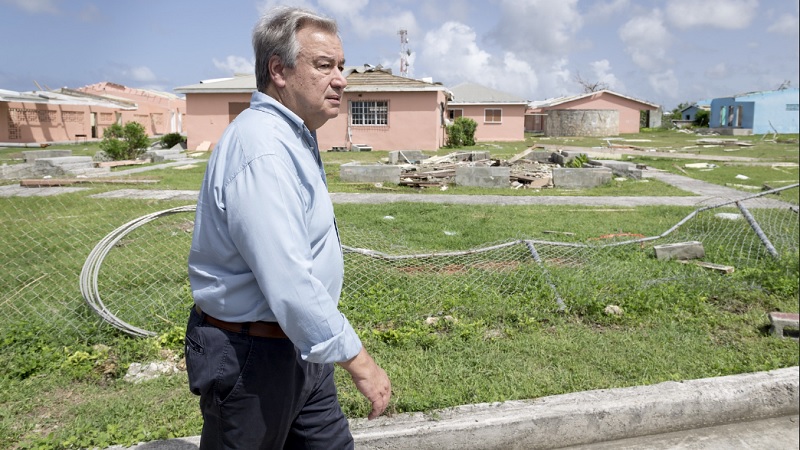A report by top economists on finance for climate action was weakened after feedback from G20 nations, even as the UN says they must all slash emissions
As UN chief António Guterres called on the G20 to “lead” on climate, Climate Home can reveal that the group of big countries watered down a report by top economists on how the financial system should shift to enable climate action.
Guterres made his comments by video at the launch of the United Nations’ Emissions Gap Report which showed that, under their current policies, the G20 countries as a group will fail to meet their 2030 targets to cut planet-heating emissions.
Separately, Climate Action Tracker has found that no G20 country’s policies are compatible with limiting global warming to the Paris Agreement goals of either 1.5 degrees Celsius or “well below” 2C.
“The largest economies – the G20 members, responsible for around 80% of all emissions – must lead,” Guterres said on Thursday.
At COP16, countries clash over future of global fund for nature protection
He spoke as officials from G20 climate and finance ministries and central bankers gathered in Washington DC to attend a meeting of the G20 Taskforce on a Global Mobilization against Climate Change (TF-CLIMA), an initiative of the Brazilian G20 presidency aimed at bringing climate and finance officials out of their silos to talk about tackling climate change.
One of their tasks is to react to a report the taskforce commissioned from a group of 12 independent experts, led by economists Vera Songwe and Mariana Mazzucato, on how the G20 countries can shift their financial systems towards tackling climate change.
Brazil’s Secretary for Climate, Energy and Environment André Aranha Corrêa do Lago told a briefing for journalists on Wednesday that the experts were requested to do a “strong report”, going beyond what the G20 can agree to in a joint declaration. It was “important to leave as a legacy a document that shows that we believe that more is needed”, he said.
The report, published on Thursday, lists five “myths” blocking climate action, including that it will slow economic growth and that governments lack the resources to fix climate change and should leave it to the market. It recommends that G20 governments should implement green industrial strategies, reform the global financial system and scale up financing for climate projects.
Weakened after criticism
However, according to a draft of the report from September 4 seen by Climate Home, the final, public version was watered down in response to critical feedback from G20 governments through their negotiators.
Comparing the earlier and later versions, there was a weakening of various points – from criticism of the G20 to warnings over climate impacts, praise for a billionaires’ tax for climate and calls for central banks to help fight climate change.
References to “G20 inaction” were replaced with “G20 inertia”, and the line “each year the destruction to the planet is harsher than the last” was deleted. A reference to a “stark increase” in global temperatures was softened to “a temperature increase on this scale”.
European Central Bank holds back plan to boost climate finance for Africa, Latam
Information in support of Brazil’s proposal for a 2% tax on the wealth of billionaires worldwide was also cut, including a description of the idea’s popularity with “electorates around the world”. An observation on the proposal’s “relatively straightforward” nature to implement was replaced by “questions over the feasibility of implementation”.
The September draft said France, Spain and South Africa supported the wealth tax proposal “while the US opposes it”, but this was deleted from the final version. The US has not made its position on the tax clear in public.
In addition, a recommendation that central banks and supervisory and regulatory bodies should mitigate climate-related financial risks and help mobilise private finance for green investments was modified with the caveat “within their mandates”.
A source with knowledge of discussions told Climate Home that the recommendations on central banks had been criticised by the US, EU and France, and some developing countries.
Despite these changes to the text, in a joint declaration G20 ministers only said they would “take note” of the report rather than welcoming it or agreeing to implement it.
Rebecca Thissen, global lead on multilateral processes at Climate Action Network International who has followed the talks closely, told Climate Home this was “not just a missed opportunity – it’s a deliberate oversight.”
“The G20 holds the tools for real change,” she said, “yet dismissing the very solutions presented to them is akin to ignoring the cure to a known disease, with full awareness of the consequences.”
Just transitio
Read More

